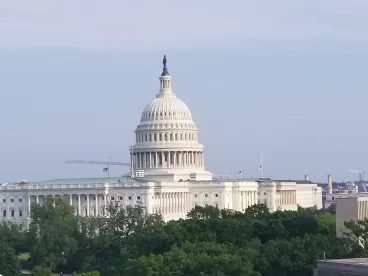Senate Democrats on Wednesday night released the draft text of the Inflation Reduction Act of 2022 (the Act). The Act includes a number of provisions related to renewable energy tax incentives.
The Act would reinstate the full investment tax credit (ITC) rate of 30% and the production tax credit (PTC) rate of 1.5 cents per kWh (subject to inflationary adjustments) for projects on which construction begins before January 1, 2025.
Additionally, the Act would adopt new provisions that would, in effect, extend the ITC and PTC at their full credit rates for projects placed in service in 2025 or later and on which construction begins before 2033. Projects would only be eligible for these credits if the greenhouse gas emissions rate for such projects is not greater than zero.
Following are several notable features of the Act:
-
Extends the ITC for investments in certain types of renewable energy facilities, including solar, fiber-optic, thermal energy projects, and other renewable energy facilities (including otherwise PTC-eligible facilities for which an ITC election is made), as long as construction of such facilities begins before 2025. The Act also would adopt a stand-alone ITC for storage facilities the construction of which begins before 2025, and would extend the ITC for certain costs associated with the construction of interconnection equipment installed in connection with other ITC-eligible facilities.
-
Renews the full 30% credit rate for ITC-eligible facilities that meet the prevailing wage and apprenticeship requirements described below, or are otherwise exempt from such requirements.
-
Extends the PTC for the production of electricity from certain types of renewable energy facilities, including wind, closed-loop and open-loop biomass, geothermal, landfill gas, trash, qualified hydropower, and marine and hydrokinetic facilities, as long as construction of such facilities begins before 2025.
-
Renews the availability of the PTC for solar facilities.
-
For both the PTC and ITC, adopts additional requirements to qualify for the full credit rates. These additional requirements include (1) satisfying certain prevailing wage requirements for wages paid to employees (including employees of contractors and subcontractors) for the construction and maintenance of facilities, and (2) minimum thresholds for employment of apprentices (including employees of contractors and subcontractors) in connection with the construction and maintenance of facilities. However, for facilities not in service prior to January 1, 2022, and on which construction begins prior to the date that is 60 days after the IRS issues additional guidance with respect to the prevailing wage and apprenticeship requirements, the full credit rate still applies even if the prevailing wage and apprenticeship requirements are not satisfied. The Act also includes an exception from the prevailing wage and apprenticeship requirements for certain small facilities.
-
Adopts credit adders for eligible PTC and ITC facilities that satisfy certain domestic content requirements and/or are located in certain “energy communities,” including brownfield sites, communities with significant employment related to extraction, processing, transport, or storage of coal, oil, or natural gas, and communities located in census tracts with closed coal mines or retired coal-fired electric generating units. Combined, these adders have the potential to increase the ITC to 50% of eligible costs and increase the PTC rate by 20%.
-
Adopts an ITC credit adder for certain wind and solar facilities located in specified low-income communities.
-
Permits certain tax-exempt entities, state and local governments, the Tennessee Valley Authority, any Indian tribal government, and any Alaska Native Corporation to receive cash payments from the government in lieu of the ITC, PTC, and certain other credits.
-
Permits taxpayers not eligible to receive cash payments described above to sell ITCs, PTCs, and certain other credits to unrelated parties.
Senate Democrats intend to vote on the Act through the budget reconciliation process, which would permit the legislation to pass with a bare majority vote in the Senate. If there is no Republican support for the Act, all 50 Democrats in the Senate would need to vote for the measure, and Vice President Kamala Harris would be required to cast the tiebreaking vote. Majority Leader Chuck Schumer intends to hold a Senate vote during the first week of August and, if the Act passes the Senate, the bill would then go to the House. President Biden has indicated that he supports the Act, but it remains to be seen whether the Act will garner sufficient support in the Senate and House. Additionally, because the Act will be subject to the budget reconciliation process, it will be subject to what is known as the “Byrd Bath.” Basically, the Byrd Bath requires that provisions in a reconciliation bill not be “extraneous.” This means that the provisions must have a budgetary effect that is more than “merely incidental.” In the end, whether a provision is “merely incidental” is decided by the Senate’s Parliamentarian who has considerable discretion in making the determination. If the Parliamentarian concludes that a provision violates the Byrd Bath rules, the provision will be taken out. It is not clear if all of the provisions in the Act will survive the Byrd Bath.





 />i
/>i
